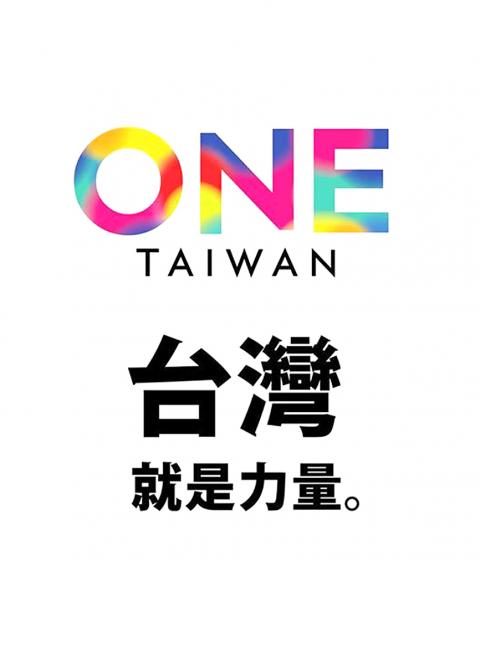Chinese Nationalist Party (KMT) presidential candidate Eric Chu’s (朱立倫) latest campaign slogan unveiled yesterday has triggered a heated online discussion on its underlying messages, as well as bringing accusations of plagiarism.
Early yesterday, Chu posted on Facebook a photograph showing a billboard in Taipei’s downtown area with the slogan “One Taiwan.”
“Past campaigns were usually a process of prolonged bickering ... but after staring at a few key words — solidarity, action and strength — which I selected from a long list, I have come to a realization about the predicaments Taiwan has experienced over the years,” Chu wrote on Facebook.

Photo: Screen grab from Facebook
Chu said he realized that people generally tend to spend more time arguing over problems than trying to tackle them, which has led to the nation’s stagnant economy and “social chaos.”
Addressing Taiwan’s problems requires unity, mutual tolerance and comprehension, Chu said.
“We must jointly march forward into the future with a multicolored, diversified, and united ‘one Taiwan,’” he said.
Some netizens were quick to fill in the blank for Chu’s campaign slogan, saying his “One Taiwan” insinuates Taiwanese independence and stands for “one Taiwan, one China.”
“It is brave of Chu to imply there is ‘one Taiwan, one China’ in his campaign slogan, but why not just say the whole thing?” Taipei City Government policy adviser Hung Chih-kun (洪智坤) said.
Others accused Chu of using the name of Taiwan to solicit votes.
“Chu is saying ‘one Taiwan’ but thinking about ‘one China,’” said a Facebook user who identified himself as Wang Chih Kang. “The 2.0 version [of President Ma Ying-jeou (馬英九)] must be thinking how gullible Taiwanese are.”
Another netizen, named Cheng Sheng-chuan (鄭勝全), compared the KMT to a schizophrenic person who thinks about “one China” on ordinary days, but automatically shifts their stance to “One Taiwan” during campaign season.
Several netizens accused Chu of plagiarism, saying there is a striking resemblance between the design for his “One Taiwan” poster and that for Democratic Progressive Party (DPP) presidential candidate Tsai Ing-wen’s (蔡英文) campaign advert “Light Up Taiwan.”
Both Tsai’s and Chu’s campaign advertisements are against a white backdrop and use a similar calligraphic style for the word “Taiwan.”
The DPP advert features a hollow circle in various shades of green, while the letter “O” in Chu’s billboard is rainbow-colored.
“Does it mean Chu agrees with Tsai’s principles and values? He should at least put the name and emblem of his party on the billboard, otherwise people might mistake it for one of Tsai’s campaign ads,” a Facebook user named Liu Che-wei (劉哲瑋) wrote.
Chu said that his “One Taiwan” idea means bringing everyone together regardless of where they are from, their social status or wealth.
“That is the primary mission of a head of state,” he said.

A preclearance service to facilitate entry for people traveling to select airports in Japan would be available from Thursday next week to Feb. 25 at Taiwan Taoyuan International Airport, Taoyuan International Airport Corp (TIAC) said on Tuesday. The service was first made available to Taiwanese travelers throughout the winter vacation of 2024 and during the Lunar New Year holiday. In addition to flights to the Japanese cities of Hakodate, Asahikawa, Akita, Sendai, Niigata, Okayama, Takamatsu, Kumamoto and Kagoshima, the service would be available to travelers to Kobe and Oita. The service can be accessed by passengers of 15 flight routes operated by

GIVE AND TAKE: Blood demand continues to rise each year, while fewer young donors are available due to the nation’s falling birthrate, a doctor said Blood donors can redeem points earned from donations to obtain limited edition Formosan black bear travel mugs, the Kaohsiung Blood Center said yesterday, as it announced a goal of stocking 20,000 units of blood prior to the Lunar New Year. The last month of the lunar year is National Blood Donation Month, when local centers seek to stockpile blood for use during the Lunar New Year holiday. The blood demand in southern Taiwan — including Tainan and Kaohsiung, as well as Chiayi, Pingtung, Penghu and Taitung counties — is about 2,000 units per day, the center said. The donation campaign aims to boost

ENHANCING EFFICIENCY: The apron can accommodate 16 airplanes overnight at Taoyuan airport while work on the third runway continues, the transport minister said A new temporary overnight parking apron at Taiwan Taoyuan International Airport is to start operating on Friday next week to boost operational efficiency while the third runway is being constructed, the Ministry of Transportation and Communications said yesterday. The apron — one of the crucial projects in the construction of the third runway — can accommodate 16 aircraft overnight at the nation’s largest international airport, Minister of Transportation and Communications Chen Shih-kai (陳世凱) told reporters while inspecting the new facility yesterday morning. Aside from providing the airport operator with greater flexibility in aircraft parking during the third runway construction,

American climber Alex Honnold is to attempt a free climb of Taipei 101 today at 9am, with traffic closures around the skyscraper. To accommodate the climb attempt and filming, the Taipei Department of Transportation said traffic controls would be enforced around the Taipei 101 area. If weather conditions delay the climb, the restrictions would be pushed back to tomorrow. Traffic controls would be in place today from 7am to 11am around the Taipei 101 area, the department said. Songzhi Road would be fully closed in both directions between Songlian Road and Xinyi Road Sec 5, it said, adding that bidirectional traffic controls would